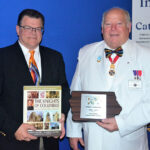 By Paatrick Schmadeke
By Paatrick Schmadeke
Evangelization in the world today

Each year, the Gospel reading for Christmas Mass during the day is the prologue from John’s Gospel. In summary and cosmic fashion, these 18 verses articulate the core of Christian faith. If one of these verses could summarize the faith, it is verse 14. English translations, going as far back as the King James (1611), Coverdale (1535) and Tyndale (1526) bibles, have rendered the verse something like this: the Word became flesh and pitched his tent among us, and we have seen his glory, the glory of the only begotten of the Father, full of grace and truth.
While this verse is familiar to us, common translations of its end don’t capture the Greek well. “Grace” and “truth” are fine, very basic dictionary translations of the Greek nouns charis and aletheia (“χάριτος καὶ ἀληθείας”). If our goal is to trade literal words for literal words, then it works. However, if our goal is to convey meaning, we need to peer more closely.
Turning to the Old Testament, we discover it probable that John’s Greek doublet charis and aletheia reflects the Old Testament Hebrew doublet hesed and ‘emet. This doublet does not mean what the English nouns “grace and truth” typically mean. In the Old Testament, they refer to God’s mercy and God’s covenant fidelity, signifying that God’s relationship to us in both testaments is one of mercy and fidelity. Thank God.
God’s mercy and fidelity are manifest in a particular way through the Incarnation. We, in relationship with God, share in this mercy and fidelity. Lumen Fidei (2013) describes this kind of dynamic: “Faith does not merely gaze at Jesus, but sees things as Jesus himself sees them, with his own eyes: it is a participation in his way of seeing.”
Three examples from the Gospel of Luke illustrate how Jesus saw others: the raising of the son of the widow of Nain (7:11-17), the Good Samaritan (10:25-37), and the Prodigal Son/Forgiving Father (15:11-32). In each story, the protagonist notices the person in need and moves immediately to aid. The description of the protagonist’s feeling often is translated as “had pity on” or “moved with compassion.” These terms, like those in John’s prologue, don’t capture the Greek well.
The underlying verb is the same in each story: splagchnizomai (σπλαγχνίζομαι). This is a thick word, often used in relation to one’s internal organs, lungs or guts or the heart as in the location of one’s feelings. Splagchnizomai is even used in relation to the womb. Thus, there is something visceral, personal and emotional about the response of the protagonist in these Lucan stories. The sight of someone in need yields a gut-wrenching, yearning desire and action towards healing.
In our time, the Church has summoned us to make room for others. “Enlarge the Space of your Tent,” (Isaiah 54:2), is the title for the Working Document for the Continental Stage of the Synod. It invites us to open our hearts to wider horizons and is indispensable to this conversion. The document from the Synod of Bishops in Rome (October 2023) states as such, “The unity of truth and love implies bearing the difficulties of others, even making them our own, as happens between brothers and sisters. This unity can only be achieved, however, by patiently following the path of accompaniment.”
I’m struck by the resonances of this passage with the three stories from Luke: suffering is shared, burden borne, the mercy of God realized. Mercy is relational. It is not so much something done, given or received as it is something one participates in and surrenders to.
We are all drawn into this, without exception: “The Church will have to initiate everyone — priests, religious and laity — into this ‘art of accompaniment’ which teaches us to remove our sandals before the sacred ground of the other” (Evangelii Gaudium #169). In this widening of the tent, we make more space for mercy and mercy creates us anew.
Our Advent journey is a heightened anticipation of the coming of Christ. If we see as Jesus saw, our splagchnizomai (compassion) will make God’s charis (mercy) and aletheia (fidelity) incarnate.
(Patrick Schmadeke is director of evangelization for the Diocese of Davenport.)











